ACT505: Accounting Theory Case Study - Sustainability in Tea Industry
VerifiedAdded on 2023/01/19
|10
|2540
|33
Case Study
AI Summary
This case study examines the sustainability approaches of Paradise Plantations Ltd., a tea company in Sri Lanka, within the context of accounting theory. It begins with an introduction to the environmental and social issues prevalent in the tea industry, such as climate change, deforestation, and labor concerns. The study then analyzes the impact of socio-political and economic factors on the company's management, accounting, and assurance processes, as per political economy theory. Strategic imperatives adopted by the company to address stakeholder needs, including customers, employees, and the environment, are discussed. The study explores how the company gains legitimacy from society through sustainable practices and examines the factors driving the adoption of sustainability measures, based on coercive, mimetic, and normative isomorphic processes. The analysis highlights the importance of addressing sustainability issues within the tea industry for long-term growth, emphasizing the need for companies to implement strategic imperatives to address social, economic, and environmental concerns. The case study references the Talawakelle Tea Estates PLC Annual Report 2017/18 as a key source for understanding the company's practices.

Accounting Theory: Case Study
1
1
Paraphrase This Document
Need a fresh take? Get an instant paraphrase of this document with our AI Paraphraser
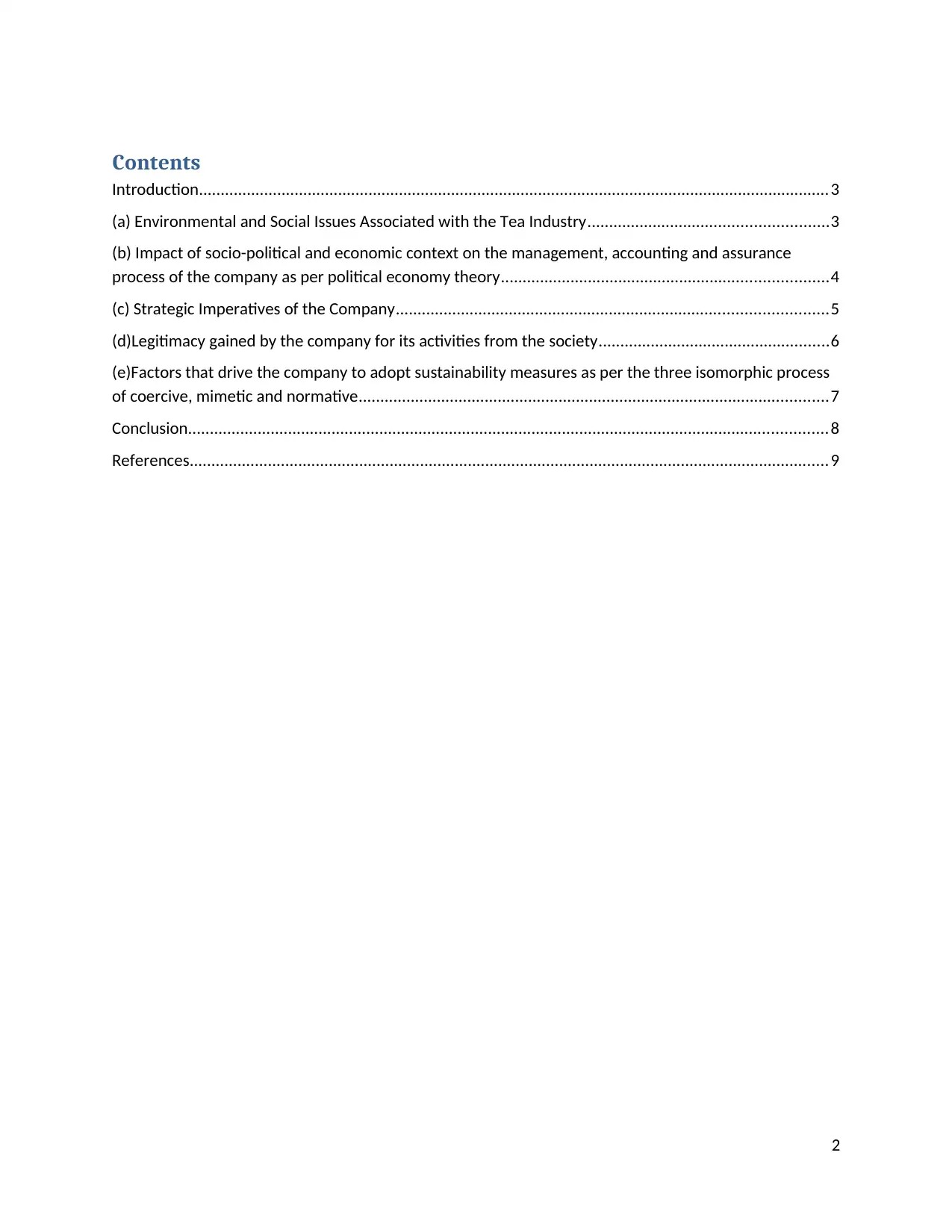
Contents
Introduction.................................................................................................................................................3
(a) Environmental and Social Issues Associated with the Tea Industry.......................................................3
(b) Impact of socio-political and economic context on the management, accounting and assurance
process of the company as per political economy theory...........................................................................4
(c) Strategic Imperatives of the Company...................................................................................................5
(d)Legitimacy gained by the company for its activities from the society.....................................................6
(e)Factors that drive the company to adopt sustainability measures as per the three isomorphic process
of coercive, mimetic and normative............................................................................................................7
Conclusion...................................................................................................................................................8
References...................................................................................................................................................9
2
Introduction.................................................................................................................................................3
(a) Environmental and Social Issues Associated with the Tea Industry.......................................................3
(b) Impact of socio-political and economic context on the management, accounting and assurance
process of the company as per political economy theory...........................................................................4
(c) Strategic Imperatives of the Company...................................................................................................5
(d)Legitimacy gained by the company for its activities from the society.....................................................6
(e)Factors that drive the company to adopt sustainability measures as per the three isomorphic process
of coercive, mimetic and normative............................................................................................................7
Conclusion...................................................................................................................................................8
References...................................................................................................................................................9
2
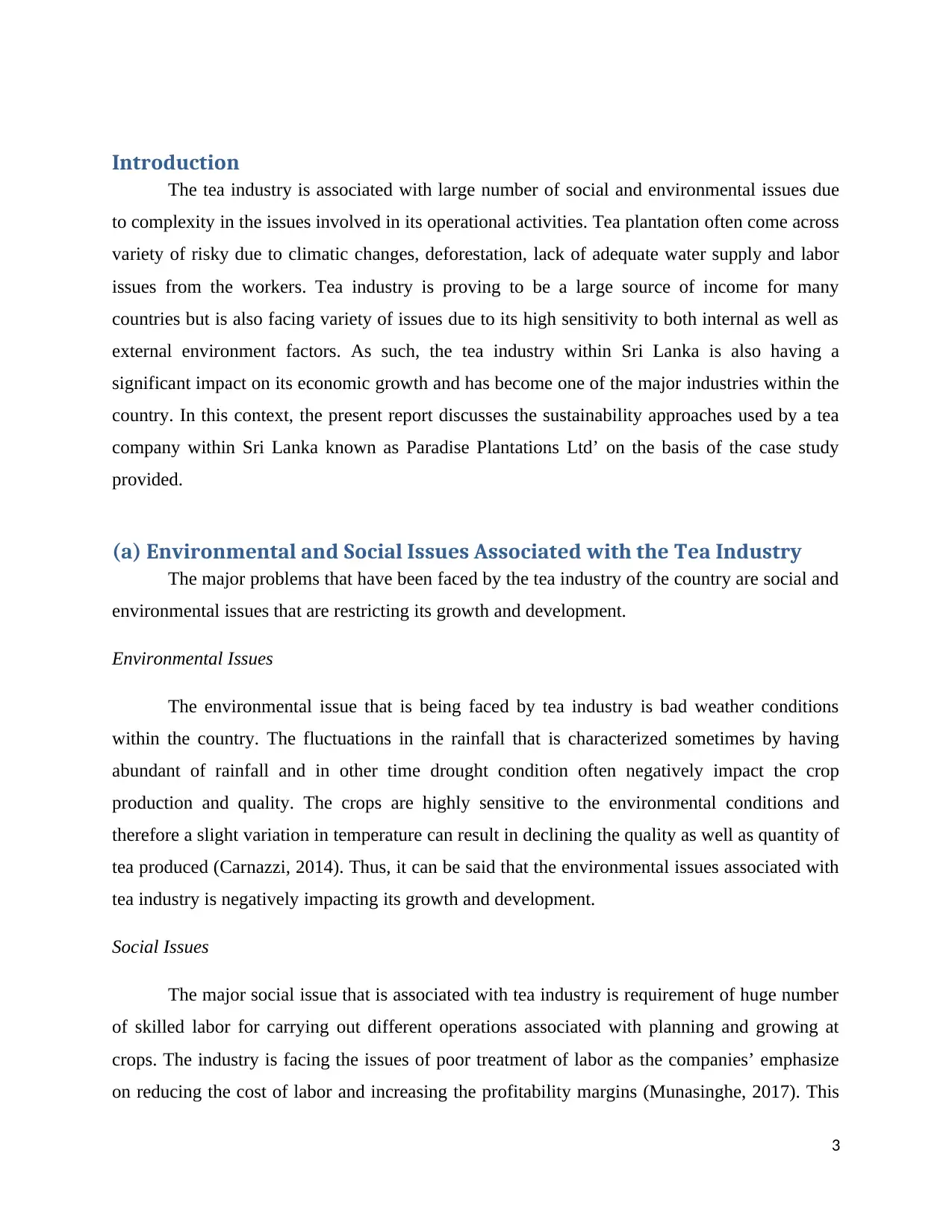
Introduction
The tea industry is associated with large number of social and environmental issues due
to complexity in the issues involved in its operational activities. Tea plantation often come across
variety of risky due to climatic changes, deforestation, lack of adequate water supply and labor
issues from the workers. Tea industry is proving to be a large source of income for many
countries but is also facing variety of issues due to its high sensitivity to both internal as well as
external environment factors. As such, the tea industry within Sri Lanka is also having a
significant impact on its economic growth and has become one of the major industries within the
country. In this context, the present report discusses the sustainability approaches used by a tea
company within Sri Lanka known as Paradise Plantations Ltd’ on the basis of the case study
provided.
(a) Environmental and Social Issues Associated with the Tea Industry
The major problems that have been faced by the tea industry of the country are social and
environmental issues that are restricting its growth and development.
Environmental Issues
The environmental issue that is being faced by tea industry is bad weather conditions
within the country. The fluctuations in the rainfall that is characterized sometimes by having
abundant of rainfall and in other time drought condition often negatively impact the crop
production and quality. The crops are highly sensitive to the environmental conditions and
therefore a slight variation in temperature can result in declining the quality as well as quantity of
tea produced (Carnazzi, 2014). Thus, it can be said that the environmental issues associated with
tea industry is negatively impacting its growth and development.
Social Issues
The major social issue that is associated with tea industry is requirement of huge number
of skilled labor for carrying out different operations associated with planning and growing at
crops. The industry is facing the issues of poor treatment of labor as the companies’ emphasize
on reducing the cost of labor and increasing the profitability margins (Munasinghe, 2017). This
3
The tea industry is associated with large number of social and environmental issues due
to complexity in the issues involved in its operational activities. Tea plantation often come across
variety of risky due to climatic changes, deforestation, lack of adequate water supply and labor
issues from the workers. Tea industry is proving to be a large source of income for many
countries but is also facing variety of issues due to its high sensitivity to both internal as well as
external environment factors. As such, the tea industry within Sri Lanka is also having a
significant impact on its economic growth and has become one of the major industries within the
country. In this context, the present report discusses the sustainability approaches used by a tea
company within Sri Lanka known as Paradise Plantations Ltd’ on the basis of the case study
provided.
(a) Environmental and Social Issues Associated with the Tea Industry
The major problems that have been faced by the tea industry of the country are social and
environmental issues that are restricting its growth and development.
Environmental Issues
The environmental issue that is being faced by tea industry is bad weather conditions
within the country. The fluctuations in the rainfall that is characterized sometimes by having
abundant of rainfall and in other time drought condition often negatively impact the crop
production and quality. The crops are highly sensitive to the environmental conditions and
therefore a slight variation in temperature can result in declining the quality as well as quantity of
tea produced (Carnazzi, 2014). Thus, it can be said that the environmental issues associated with
tea industry is negatively impacting its growth and development.
Social Issues
The major social issue that is associated with tea industry is requirement of huge number
of skilled labor for carrying out different operations associated with planning and growing at
crops. The industry is facing the issues of poor treatment of labor as the companies’ emphasize
on reducing the cost of labor and increasing the profitability margins (Munasinghe, 2017). This
3
⊘ This is a preview!⊘
Do you want full access?
Subscribe today to unlock all pages.

Trusted by 1+ million students worldwide
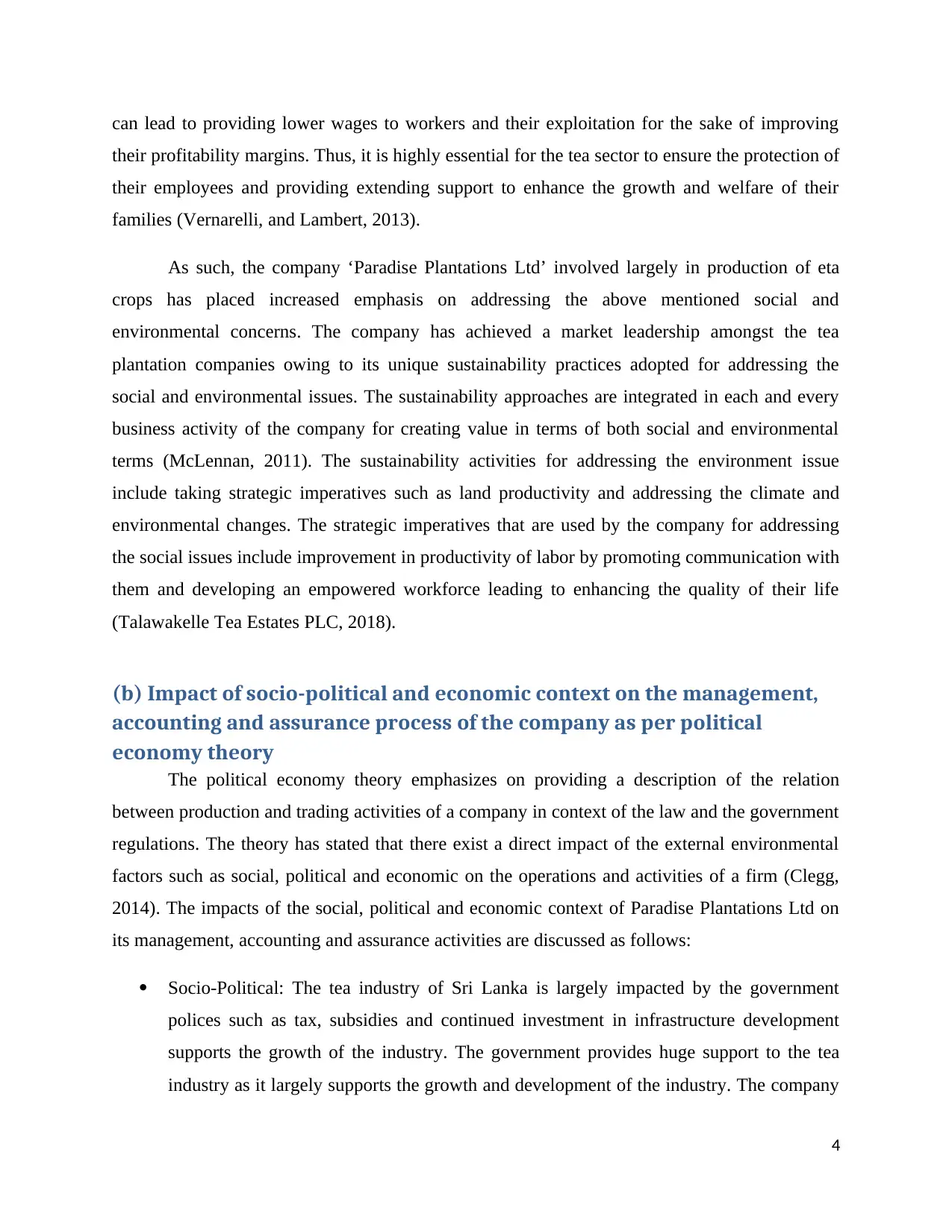
can lead to providing lower wages to workers and their exploitation for the sake of improving
their profitability margins. Thus, it is highly essential for the tea sector to ensure the protection of
their employees and providing extending support to enhance the growth and welfare of their
families (Vernarelli, and Lambert, 2013).
As such, the company ‘Paradise Plantations Ltd’ involved largely in production of eta
crops has placed increased emphasis on addressing the above mentioned social and
environmental concerns. The company has achieved a market leadership amongst the tea
plantation companies owing to its unique sustainability practices adopted for addressing the
social and environmental issues. The sustainability approaches are integrated in each and every
business activity of the company for creating value in terms of both social and environmental
terms (McLennan, 2011). The sustainability activities for addressing the environment issue
include taking strategic imperatives such as land productivity and addressing the climate and
environmental changes. The strategic imperatives that are used by the company for addressing
the social issues include improvement in productivity of labor by promoting communication with
them and developing an empowered workforce leading to enhancing the quality of their life
(Talawakelle Tea Estates PLC, 2018).
(b) Impact of socio-political and economic context on the management,
accounting and assurance process of the company as per political
economy theory
The political economy theory emphasizes on providing a description of the relation
between production and trading activities of a company in context of the law and the government
regulations. The theory has stated that there exist a direct impact of the external environmental
factors such as social, political and economic on the operations and activities of a firm (Clegg,
2014). The impacts of the social, political and economic context of Paradise Plantations Ltd on
its management, accounting and assurance activities are discussed as follows:
Socio-Political: The tea industry of Sri Lanka is largely impacted by the government
polices such as tax, subsidies and continued investment in infrastructure development
supports the growth of the industry. The government provides huge support to the tea
industry as it largely supports the growth and development of the industry. The company
4
their profitability margins. Thus, it is highly essential for the tea sector to ensure the protection of
their employees and providing extending support to enhance the growth and welfare of their
families (Vernarelli, and Lambert, 2013).
As such, the company ‘Paradise Plantations Ltd’ involved largely in production of eta
crops has placed increased emphasis on addressing the above mentioned social and
environmental concerns. The company has achieved a market leadership amongst the tea
plantation companies owing to its unique sustainability practices adopted for addressing the
social and environmental issues. The sustainability approaches are integrated in each and every
business activity of the company for creating value in terms of both social and environmental
terms (McLennan, 2011). The sustainability activities for addressing the environment issue
include taking strategic imperatives such as land productivity and addressing the climate and
environmental changes. The strategic imperatives that are used by the company for addressing
the social issues include improvement in productivity of labor by promoting communication with
them and developing an empowered workforce leading to enhancing the quality of their life
(Talawakelle Tea Estates PLC, 2018).
(b) Impact of socio-political and economic context on the management,
accounting and assurance process of the company as per political
economy theory
The political economy theory emphasizes on providing a description of the relation
between production and trading activities of a company in context of the law and the government
regulations. The theory has stated that there exist a direct impact of the external environmental
factors such as social, political and economic on the operations and activities of a firm (Clegg,
2014). The impacts of the social, political and economic context of Paradise Plantations Ltd on
its management, accounting and assurance activities are discussed as follows:
Socio-Political: The tea industry of Sri Lanka is largely impacted by the government
polices such as tax, subsidies and continued investment in infrastructure development
supports the growth of the industry. The government provides huge support to the tea
industry as it largely supports the growth and development of the industry. The company
4
Paraphrase This Document
Need a fresh take? Get an instant paraphrase of this document with our AI Paraphraser
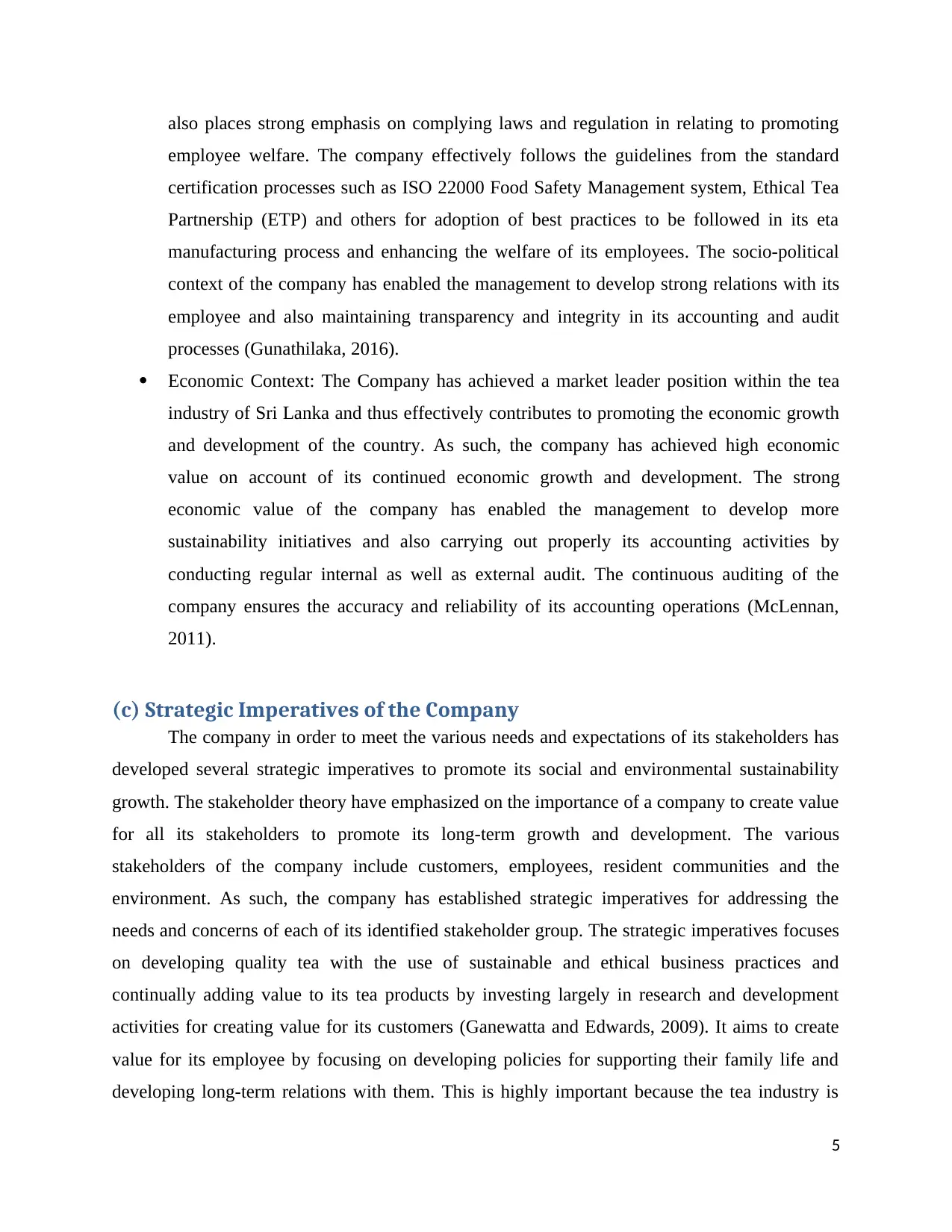
also places strong emphasis on complying laws and regulation in relating to promoting
employee welfare. The company effectively follows the guidelines from the standard
certification processes such as ISO 22000 Food Safety Management system, Ethical Tea
Partnership (ETP) and others for adoption of best practices to be followed in its eta
manufacturing process and enhancing the welfare of its employees. The socio-political
context of the company has enabled the management to develop strong relations with its
employee and also maintaining transparency and integrity in its accounting and audit
processes (Gunathilaka, 2016).
Economic Context: The Company has achieved a market leader position within the tea
industry of Sri Lanka and thus effectively contributes to promoting the economic growth
and development of the country. As such, the company has achieved high economic
value on account of its continued economic growth and development. The strong
economic value of the company has enabled the management to develop more
sustainability initiatives and also carrying out properly its accounting activities by
conducting regular internal as well as external audit. The continuous auditing of the
company ensures the accuracy and reliability of its accounting operations (McLennan,
2011).
(c) Strategic Imperatives of the Company
The company in order to meet the various needs and expectations of its stakeholders has
developed several strategic imperatives to promote its social and environmental sustainability
growth. The stakeholder theory have emphasized on the importance of a company to create value
for all its stakeholders to promote its long-term growth and development. The various
stakeholders of the company include customers, employees, resident communities and the
environment. As such, the company has established strategic imperatives for addressing the
needs and concerns of each of its identified stakeholder group. The strategic imperatives focuses
on developing quality tea with the use of sustainable and ethical business practices and
continually adding value to its tea products by investing largely in research and development
activities for creating value for its customers (Ganewatta and Edwards, 2009). It aims to create
value for its employee by focusing on developing policies for supporting their family life and
developing long-term relations with them. This is highly important because the tea industry is
5
employee welfare. The company effectively follows the guidelines from the standard
certification processes such as ISO 22000 Food Safety Management system, Ethical Tea
Partnership (ETP) and others for adoption of best practices to be followed in its eta
manufacturing process and enhancing the welfare of its employees. The socio-political
context of the company has enabled the management to develop strong relations with its
employee and also maintaining transparency and integrity in its accounting and audit
processes (Gunathilaka, 2016).
Economic Context: The Company has achieved a market leader position within the tea
industry of Sri Lanka and thus effectively contributes to promoting the economic growth
and development of the country. As such, the company has achieved high economic
value on account of its continued economic growth and development. The strong
economic value of the company has enabled the management to develop more
sustainability initiatives and also carrying out properly its accounting activities by
conducting regular internal as well as external audit. The continuous auditing of the
company ensures the accuracy and reliability of its accounting operations (McLennan,
2011).
(c) Strategic Imperatives of the Company
The company in order to meet the various needs and expectations of its stakeholders has
developed several strategic imperatives to promote its social and environmental sustainability
growth. The stakeholder theory have emphasized on the importance of a company to create value
for all its stakeholders to promote its long-term growth and development. The various
stakeholders of the company include customers, employees, resident communities and the
environment. As such, the company has established strategic imperatives for addressing the
needs and concerns of each of its identified stakeholder group. The strategic imperatives focuses
on developing quality tea with the use of sustainable and ethical business practices and
continually adding value to its tea products by investing largely in research and development
activities for creating value for its customers (Ganewatta and Edwards, 2009). It aims to create
value for its employee by focusing on developing policies for supporting their family life and
developing long-term relations with them. This is highly important because the tea industry is
5
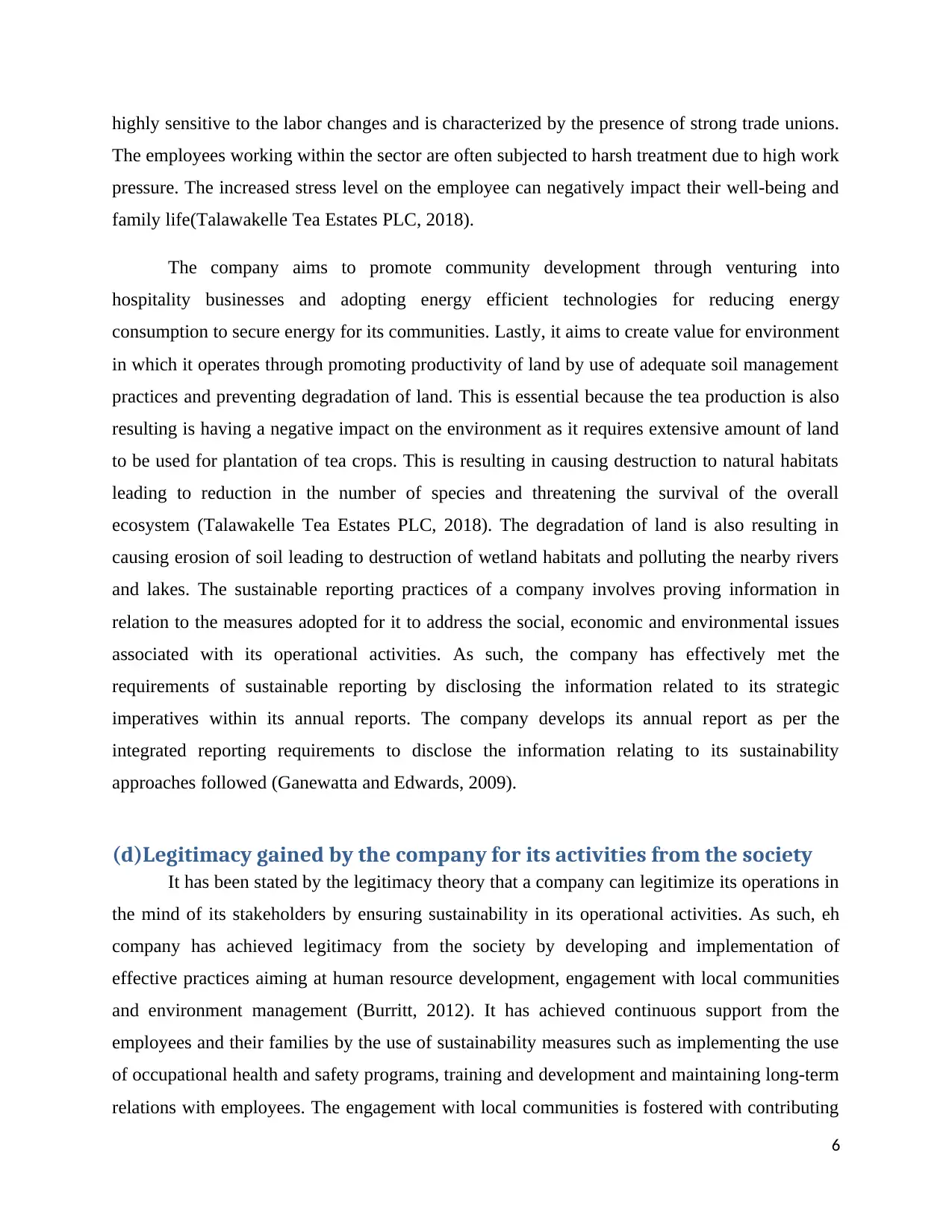
highly sensitive to the labor changes and is characterized by the presence of strong trade unions.
The employees working within the sector are often subjected to harsh treatment due to high work
pressure. The increased stress level on the employee can negatively impact their well-being and
family life(Talawakelle Tea Estates PLC, 2018).
The company aims to promote community development through venturing into
hospitality businesses and adopting energy efficient technologies for reducing energy
consumption to secure energy for its communities. Lastly, it aims to create value for environment
in which it operates through promoting productivity of land by use of adequate soil management
practices and preventing degradation of land. This is essential because the tea production is also
resulting is having a negative impact on the environment as it requires extensive amount of land
to be used for plantation of tea crops. This is resulting in causing destruction to natural habitats
leading to reduction in the number of species and threatening the survival of the overall
ecosystem (Talawakelle Tea Estates PLC, 2018). The degradation of land is also resulting in
causing erosion of soil leading to destruction of wetland habitats and polluting the nearby rivers
and lakes. The sustainable reporting practices of a company involves proving information in
relation to the measures adopted for it to address the social, economic and environmental issues
associated with its operational activities. As such, the company has effectively met the
requirements of sustainable reporting by disclosing the information related to its strategic
imperatives within its annual reports. The company develops its annual report as per the
integrated reporting requirements to disclose the information relating to its sustainability
approaches followed (Ganewatta and Edwards, 2009).
(d)Legitimacy gained by the company for its activities from the society
It has been stated by the legitimacy theory that a company can legitimize its operations in
the mind of its stakeholders by ensuring sustainability in its operational activities. As such, eh
company has achieved legitimacy from the society by developing and implementation of
effective practices aiming at human resource development, engagement with local communities
and environment management (Burritt, 2012). It has achieved continuous support from the
employees and their families by the use of sustainability measures such as implementing the use
of occupational health and safety programs, training and development and maintaining long-term
relations with employees. The engagement with local communities is fostered with contributing
6
The employees working within the sector are often subjected to harsh treatment due to high work
pressure. The increased stress level on the employee can negatively impact their well-being and
family life(Talawakelle Tea Estates PLC, 2018).
The company aims to promote community development through venturing into
hospitality businesses and adopting energy efficient technologies for reducing energy
consumption to secure energy for its communities. Lastly, it aims to create value for environment
in which it operates through promoting productivity of land by use of adequate soil management
practices and preventing degradation of land. This is essential because the tea production is also
resulting is having a negative impact on the environment as it requires extensive amount of land
to be used for plantation of tea crops. This is resulting in causing destruction to natural habitats
leading to reduction in the number of species and threatening the survival of the overall
ecosystem (Talawakelle Tea Estates PLC, 2018). The degradation of land is also resulting in
causing erosion of soil leading to destruction of wetland habitats and polluting the nearby rivers
and lakes. The sustainable reporting practices of a company involves proving information in
relation to the measures adopted for it to address the social, economic and environmental issues
associated with its operational activities. As such, the company has effectively met the
requirements of sustainable reporting by disclosing the information related to its strategic
imperatives within its annual reports. The company develops its annual report as per the
integrated reporting requirements to disclose the information relating to its sustainability
approaches followed (Ganewatta and Edwards, 2009).
(d)Legitimacy gained by the company for its activities from the society
It has been stated by the legitimacy theory that a company can legitimize its operations in
the mind of its stakeholders by ensuring sustainability in its operational activities. As such, eh
company has achieved legitimacy from the society by developing and implementation of
effective practices aiming at human resource development, engagement with local communities
and environment management (Burritt, 2012). It has achieved continuous support from the
employees and their families by the use of sustainability measures such as implementing the use
of occupational health and safety programs, training and development and maintaining long-term
relations with employees. The engagement with local communities is fostered with contributing
6
⊘ This is a preview!⊘
Do you want full access?
Subscribe today to unlock all pages.

Trusted by 1+ million students worldwide
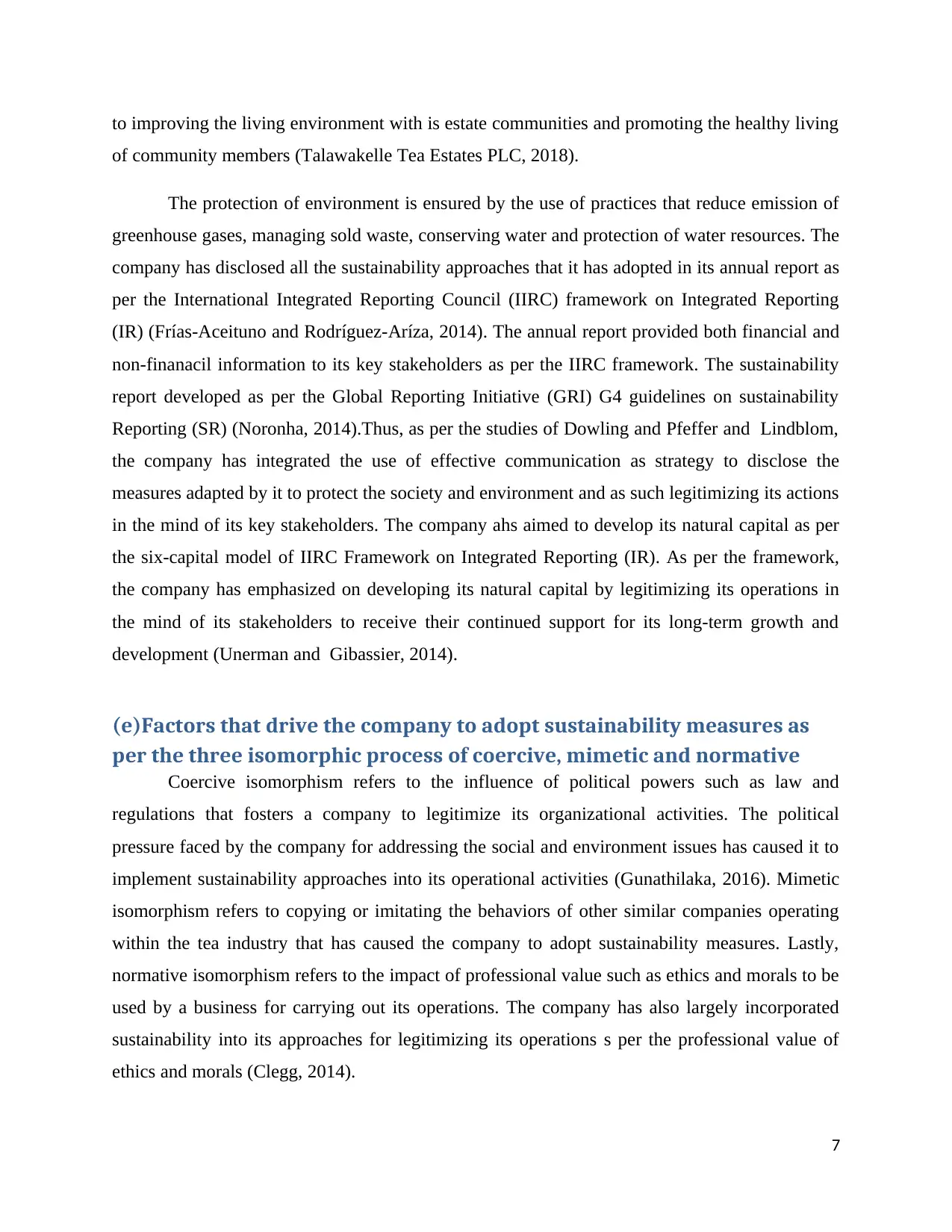
to improving the living environment with is estate communities and promoting the healthy living
of community members (Talawakelle Tea Estates PLC, 2018).
The protection of environment is ensured by the use of practices that reduce emission of
greenhouse gases, managing sold waste, conserving water and protection of water resources. The
company has disclosed all the sustainability approaches that it has adopted in its annual report as
per the International Integrated Reporting Council (IIRC) framework on Integrated Reporting
(IR) (Frías-Aceituno and Rodríguez-Aríza, 2014). The annual report provided both financial and
non-finanacil information to its key stakeholders as per the IIRC framework. The sustainability
report developed as per the Global Reporting Initiative (GRI) G4 guidelines on sustainability
Reporting (SR) (Noronha, 2014).Thus, as per the studies of Dowling and Pfeffer and Lindblom,
the company has integrated the use of effective communication as strategy to disclose the
measures adapted by it to protect the society and environment and as such legitimizing its actions
in the mind of its key stakeholders. The company ahs aimed to develop its natural capital as per
the six-capital model of IIRC Framework on Integrated Reporting (IR). As per the framework,
the company has emphasized on developing its natural capital by legitimizing its operations in
the mind of its stakeholders to receive their continued support for its long-term growth and
development (Unerman and Gibassier, 2014).
(e)Factors that drive the company to adopt sustainability measures as
per the three isomorphic process of coercive, mimetic and normative
Coercive isomorphism refers to the influence of political powers such as law and
regulations that fosters a company to legitimize its organizational activities. The political
pressure faced by the company for addressing the social and environment issues has caused it to
implement sustainability approaches into its operational activities (Gunathilaka, 2016). Mimetic
isomorphism refers to copying or imitating the behaviors of other similar companies operating
within the tea industry that has caused the company to adopt sustainability measures. Lastly,
normative isomorphism refers to the impact of professional value such as ethics and morals to be
used by a business for carrying out its operations. The company has also largely incorporated
sustainability into its approaches for legitimizing its operations s per the professional value of
ethics and morals (Clegg, 2014).
7
of community members (Talawakelle Tea Estates PLC, 2018).
The protection of environment is ensured by the use of practices that reduce emission of
greenhouse gases, managing sold waste, conserving water and protection of water resources. The
company has disclosed all the sustainability approaches that it has adopted in its annual report as
per the International Integrated Reporting Council (IIRC) framework on Integrated Reporting
(IR) (Frías-Aceituno and Rodríguez-Aríza, 2014). The annual report provided both financial and
non-finanacil information to its key stakeholders as per the IIRC framework. The sustainability
report developed as per the Global Reporting Initiative (GRI) G4 guidelines on sustainability
Reporting (SR) (Noronha, 2014).Thus, as per the studies of Dowling and Pfeffer and Lindblom,
the company has integrated the use of effective communication as strategy to disclose the
measures adapted by it to protect the society and environment and as such legitimizing its actions
in the mind of its key stakeholders. The company ahs aimed to develop its natural capital as per
the six-capital model of IIRC Framework on Integrated Reporting (IR). As per the framework,
the company has emphasized on developing its natural capital by legitimizing its operations in
the mind of its stakeholders to receive their continued support for its long-term growth and
development (Unerman and Gibassier, 2014).
(e)Factors that drive the company to adopt sustainability measures as
per the three isomorphic process of coercive, mimetic and normative
Coercive isomorphism refers to the influence of political powers such as law and
regulations that fosters a company to legitimize its organizational activities. The political
pressure faced by the company for addressing the social and environment issues has caused it to
implement sustainability approaches into its operational activities (Gunathilaka, 2016). Mimetic
isomorphism refers to copying or imitating the behaviors of other similar companies operating
within the tea industry that has caused the company to adopt sustainability measures. Lastly,
normative isomorphism refers to the impact of professional value such as ethics and morals to be
used by a business for carrying out its operations. The company has also largely incorporated
sustainability into its approaches for legitimizing its operations s per the professional value of
ethics and morals (Clegg, 2014).
7
Paraphrase This Document
Need a fresh take? Get an instant paraphrase of this document with our AI Paraphraser
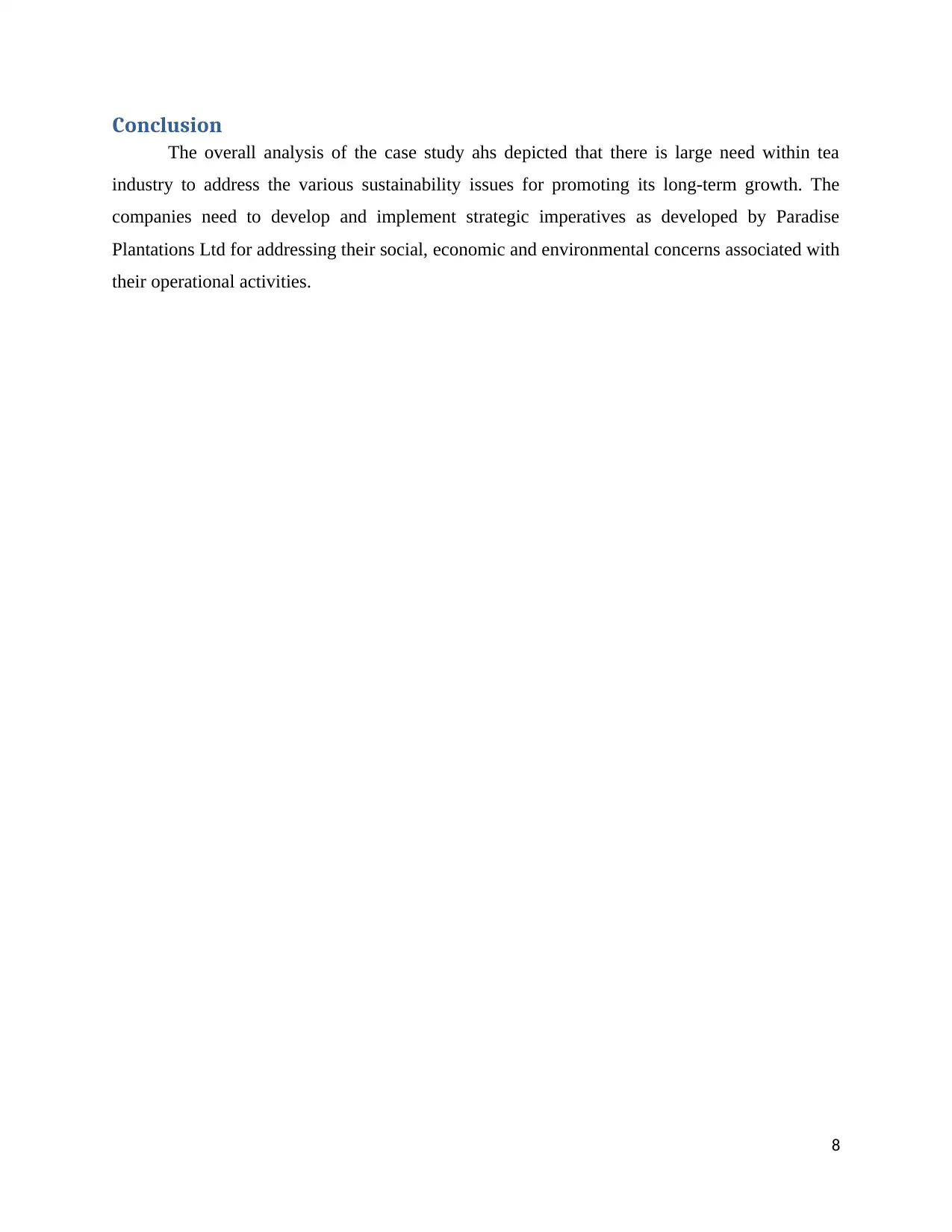
Conclusion
The overall analysis of the case study ahs depicted that there is large need within tea
industry to address the various sustainability issues for promoting its long-term growth. The
companies need to develop and implement strategic imperatives as developed by Paradise
Plantations Ltd for addressing their social, economic and environmental concerns associated with
their operational activities.
8
The overall analysis of the case study ahs depicted that there is large need within tea
industry to address the various sustainability issues for promoting its long-term growth. The
companies need to develop and implement strategic imperatives as developed by Paradise
Plantations Ltd for addressing their social, economic and environmental concerns associated with
their operational activities.
8
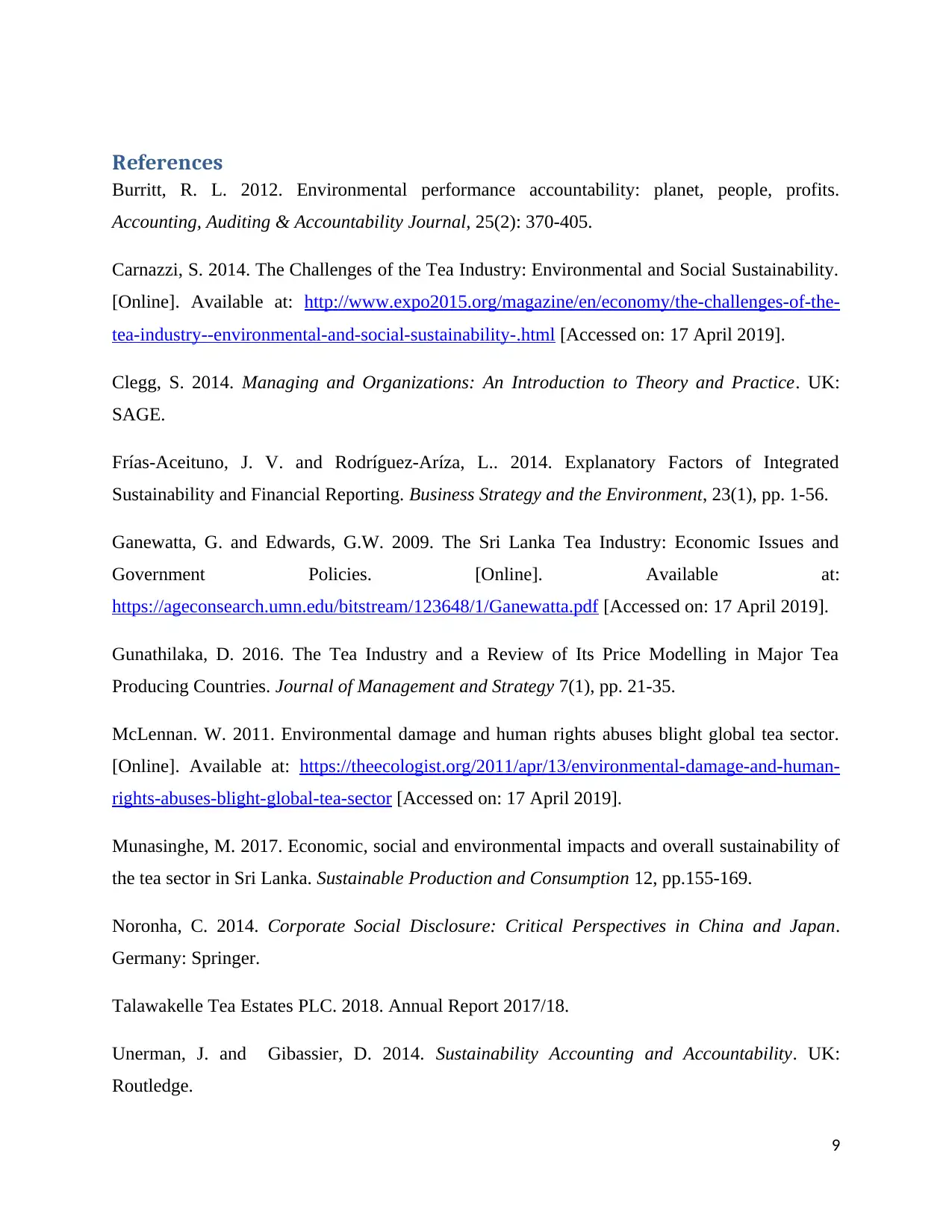
References
Burritt, R. L. 2012. Environmental performance accountability: planet, people, profits.
Accounting, Auditing & Accountability Journal, 25(2): 370-405.
Carnazzi, S. 2014. The Challenges of the Tea Industry: Environmental and Social Sustainability.
[Online]. Available at: http://www.expo2015.org/magazine/en/economy/the-challenges-of-the-
tea-industry--environmental-and-social-sustainability-.html [Accessed on: 17 April 2019].
Clegg, S. 2014. Managing and Organizations: An Introduction to Theory and Practice. UK:
SAGE.
Frías-Aceituno, J. V. and Rodríguez-Aríza, L.. 2014. Explanatory Factors of Integrated
Sustainability and Financial Reporting. Business Strategy and the Environment, 23(1), pp. 1-56.
Ganewatta, G. and Edwards, G.W. 2009. The Sri Lanka Tea Industry: Economic Issues and
Government Policies. [Online]. Available at:
https://ageconsearch.umn.edu/bitstream/123648/1/Ganewatta.pdf [Accessed on: 17 April 2019].
Gunathilaka, D. 2016. The Tea Industry and a Review of Its Price Modelling in Major Tea
Producing Countries. Journal of Management and Strategy 7(1), pp. 21-35.
McLennan. W. 2011. Environmental damage and human rights abuses blight global tea sector.
[Online]. Available at: https://theecologist.org/2011/apr/13/environmental-damage-and-human-
rights-abuses-blight-global-tea-sector [Accessed on: 17 April 2019].
Munasinghe, M. 2017. Economic, social and environmental impacts and overall sustainability of
the tea sector in Sri Lanka. Sustainable Production and Consumption 12, pp.155-169.
Noronha, C. 2014. Corporate Social Disclosure: Critical Perspectives in China and Japan.
Germany: Springer.
Talawakelle Tea Estates PLC. 2018. Annual Report 2017/18.
Unerman, J. and Gibassier, D. 2014. Sustainability Accounting and Accountability. UK:
Routledge.
9
Burritt, R. L. 2012. Environmental performance accountability: planet, people, profits.
Accounting, Auditing & Accountability Journal, 25(2): 370-405.
Carnazzi, S. 2014. The Challenges of the Tea Industry: Environmental and Social Sustainability.
[Online]. Available at: http://www.expo2015.org/magazine/en/economy/the-challenges-of-the-
tea-industry--environmental-and-social-sustainability-.html [Accessed on: 17 April 2019].
Clegg, S. 2014. Managing and Organizations: An Introduction to Theory and Practice. UK:
SAGE.
Frías-Aceituno, J. V. and Rodríguez-Aríza, L.. 2014. Explanatory Factors of Integrated
Sustainability and Financial Reporting. Business Strategy and the Environment, 23(1), pp. 1-56.
Ganewatta, G. and Edwards, G.W. 2009. The Sri Lanka Tea Industry: Economic Issues and
Government Policies. [Online]. Available at:
https://ageconsearch.umn.edu/bitstream/123648/1/Ganewatta.pdf [Accessed on: 17 April 2019].
Gunathilaka, D. 2016. The Tea Industry and a Review of Its Price Modelling in Major Tea
Producing Countries. Journal of Management and Strategy 7(1), pp. 21-35.
McLennan. W. 2011. Environmental damage and human rights abuses blight global tea sector.
[Online]. Available at: https://theecologist.org/2011/apr/13/environmental-damage-and-human-
rights-abuses-blight-global-tea-sector [Accessed on: 17 April 2019].
Munasinghe, M. 2017. Economic, social and environmental impacts and overall sustainability of
the tea sector in Sri Lanka. Sustainable Production and Consumption 12, pp.155-169.
Noronha, C. 2014. Corporate Social Disclosure: Critical Perspectives in China and Japan.
Germany: Springer.
Talawakelle Tea Estates PLC. 2018. Annual Report 2017/18.
Unerman, J. and Gibassier, D. 2014. Sustainability Accounting and Accountability. UK:
Routledge.
9
⊘ This is a preview!⊘
Do you want full access?
Subscribe today to unlock all pages.

Trusted by 1+ million students worldwide
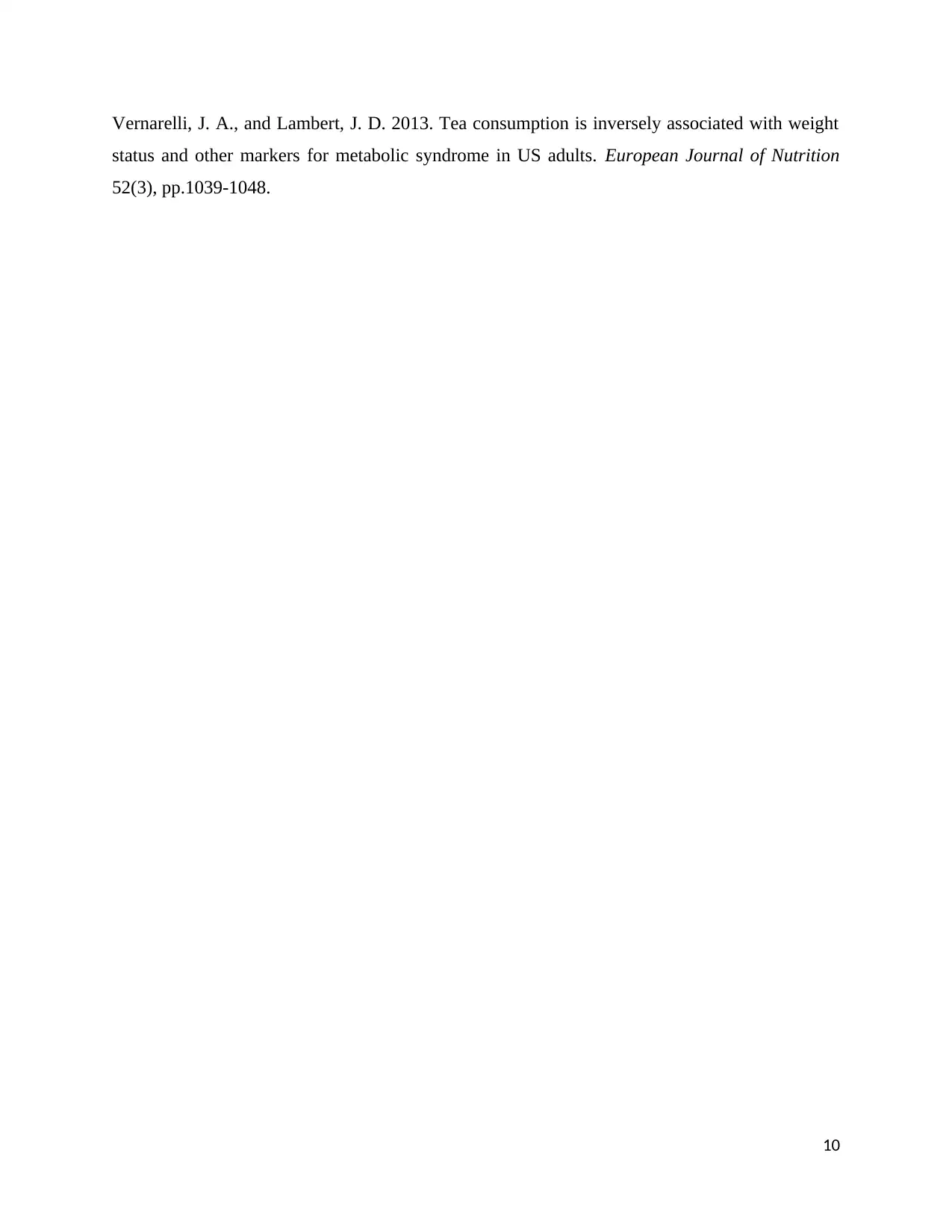
Vernarelli, J. A., and Lambert, J. D. 2013. Tea consumption is inversely associated with weight
status and other markers for metabolic syndrome in US adults. European Journal of Nutrition
52(3), pp.1039-1048.
10
status and other markers for metabolic syndrome in US adults. European Journal of Nutrition
52(3), pp.1039-1048.
10
1 out of 10
Related Documents
Your All-in-One AI-Powered Toolkit for Academic Success.
+13062052269
info@desklib.com
Available 24*7 on WhatsApp / Email
![[object Object]](/_next/static/media/star-bottom.7253800d.svg)
Unlock your academic potential
Copyright © 2020–2026 A2Z Services. All Rights Reserved. Developed and managed by ZUCOL.





